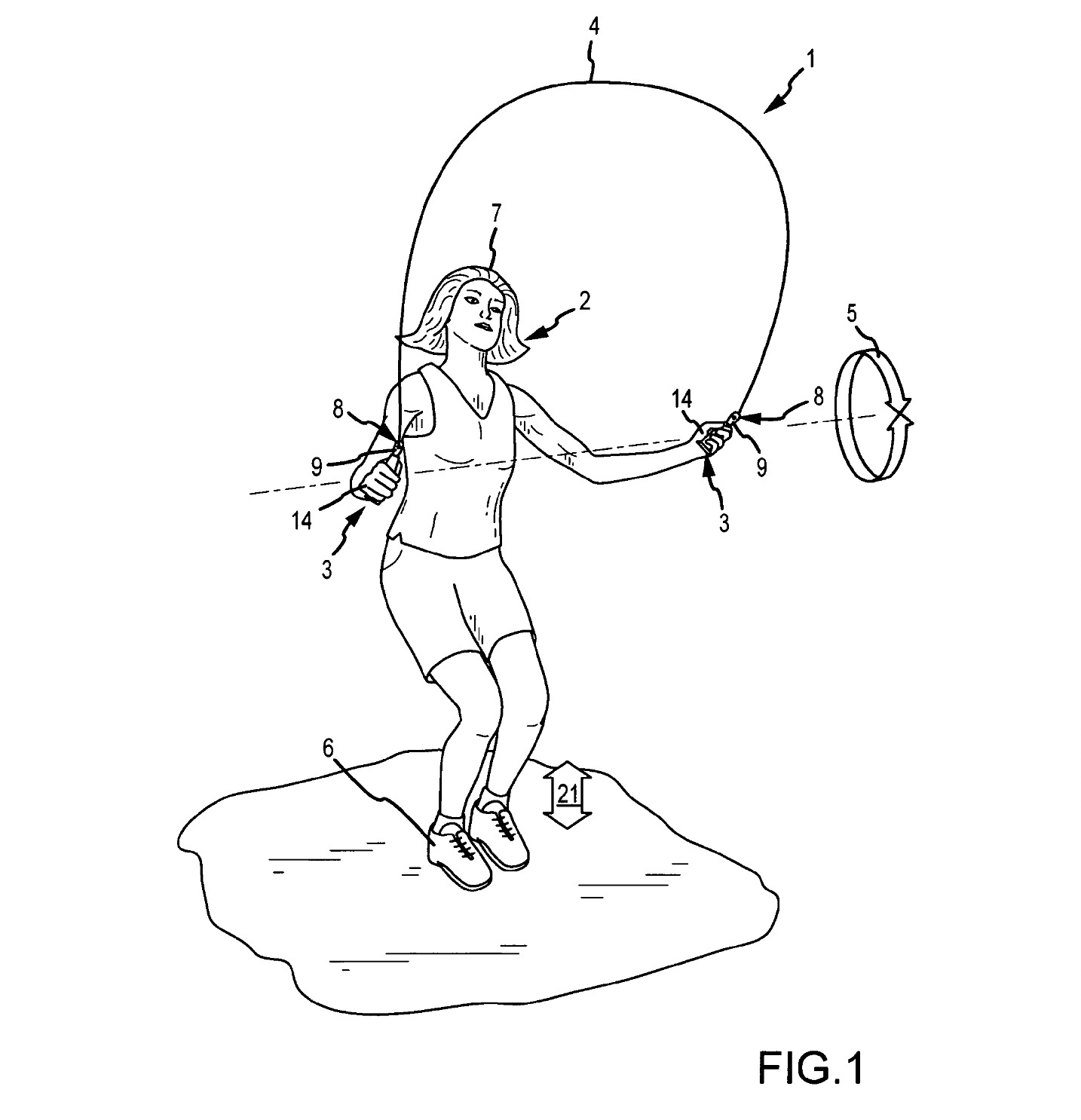Revolution Rope Inventor Tells Justices She Deserves Her Day in Article III Court
“Rogue’s argument is circular and tautological: because the PTAB found claims unpatentable under a lower burden, JRS loses the protections of a higher burden in the other venue when litigating the identical issue. But ‘unpatentability’ is not a categorical truth; it is a litigation outcome among adversaries.”
US Patent 7,789,809 B2
The inventor of a novel jump rope system (the Revolution Rope), Molly Metz, argued in a reply brief to the U.S. Supreme Court filed on behalf of her company, Jump Rope Systems, LLC, on Tuesday that her case against Rogue Fitness is justiciable and the company has standing despite the cancellation of her patent claims by the U.S. Patent and Trademark Office (USPTO).
Jump Rope Systems filed the brief in reply to Rogue Fitness’s brief in opposition, which was filed on January 19.
Metz and Jump Rope Systems originally sued Rogue Fitness in 2018. But after Rogue filed a petition for inter partes review (IPR), the Patent Trial and Appeal Board (PTAB) ruled that Jump Rope Systems’ two patents (US 7,789,809 B2 and US 8,136.208 B2) related to jump rope handle technology were unpatentable.
The reply brief’s main contentions are that the cancellation of the patents did not end Jump Rope Systems’ right to sue Rogue for damages previous to the cancellation and that IPR violates due process.
The brief also reiterates the company’s previously filed petition asking the Supreme Court to “address the merits of the collateral-estoppel issue and overrule the Federal Circuit’s decision in XY, LLC.”
The Petition
In their September 2022 petition for a writ of certiorari, Metz’s lawyers made the case that the CAFC’s application of the collateral estoppel doctrine barring a patent infringement lawsuit based on the PTAB’s previous ruling of patent invalidity conflicts with the Supreme Court decisions in B&B Hardware, Inc. v. Hargis Indus., 575 U.S. 138 (2015); Medtronic, Inc. v. Mirowski Family Ventures, LLC, 571 U.S. 191 (2014); and Grogan v. Garner, 498 U.S. 279 (1991).
Additionally, Jump Rope Systems argued in the petition that the Supreme Court should take up the case because “this case…concerns a frequently recurring issue of nationwide importance in patent infringement litigation and presents an excellent vehicle for this court’s review of that important issue.”
In its reply brief, the company added: “the related issues of collateral-estoppel and justiciability arise in hundreds of patent-infringement cases each year and, thus, have a substantial effect on patent-infringement litigation.”
The company’s main gripe is that it was never permitted to have its patent infringement claims heard by an Article III court or federal jury due to “the Federal Circuit’s entrenched and oft-repeated misapplication of the collateral estoppel doctrine beginning in XY, LLC v. Trans Ova Genetics, L.C.”
Rogue Fitness’s Brief
Rogue’s brief in opposition presents four main reasons why the writ of certiorari should be denied.
First, Rogue argues that the petition is moot because Jump Rope Systems lacks standing following the USPTO’s cancellation of the claims on August 3, 2022—after the Federal Circuit’s decision in the case was issued.
The brief also argues that collateral estoppel applies because “cancellation of patent claims in an IPR must be binding on a parallel infringement litigation.”
The two final reasons that Rogue Fitness presents are precedent and that the case is a “poor vehicle for analyzing the issues presented.”
In its reply, Jump Rope Systems took issue with several cases that Rogue cited as precedent. Rogue argued that Jump Rope Systems had no patent rights since the PTAB ruled the claims were canceled. However, the reply brief argues the cited cases involved reissue patents, where patentholders voluntarily surrender the original patent, which Jump Rope Systems has not done.
Similarly, the reply brief takes issue with Rogue’s discussion of the collateral-estoppel doctrine. It contends that “Rogue’s arguments brushing off different standards and burden in an IPR versus a patent-infringement lawsuit lack merit.” The brief continues:
“Rogue’s argument is circular and tautological: because the PTAB found claims unpatentable under a lower burden, JRS loses the protections of a higher burden in the other venue when litigating the identical issue. But ‘unpatentability’ is not a categorical truth; it is a litigation outcome among adversaries. The Restatement exception (and Blonder-Tongue’s adoption thereof ) specifically exists to foreclose use of the low- burden outcome to obviate the high-burden challenge. No authority holds that a low-burden agency result justifies overlooking the higher Article III burden on the same issue.”
While Rogue argued this approach would make IPR proceedings “pointless”, Jump Rope Systems wrote that they would remain an alternative to litigation. “When a patentholder loses, and if IPR passes due process muster, no prospective injunction or damages would be possible for future infringement of the canceled patent,” argued the company in its brief reply.
A Long Journey
Molly Metz, the Colorado inventor behind Jump Rope Systems, told IPWatchdog in June 2022 about her precision speed jump rope handle, the patent infringement story, and her experience with the PTAB invalidating her patents.
“What happened to me is happening to others like me. Each week I get to hear from other inventors and their experience with PTAB. This system is broken and is ruining small businesses and the morale of U.S. innovators,” said Metz
When Metz noticed Rogue Fitness released a line of jump ropes using her patented technology, she filed a patent infringement lawsuit in 2018.
Subsequently, Rogue filed a petition for inter partes review, and the PTAB invalidated Metz’s two patents.
Several amici briefs have now been filed with the Supreme Court, including by Eagle Forum Education and Legal Defense Fund, the Fair Inventing Fund, DivX, the Fair Inventing Fund and Josh Malone.
Eagle Forum argued, “the loss is not merely to this inventor but to all future American inventors whose creative genius is thereby discouraged.”
This article was updated on February 2 to indicate additional amicus briefs have been filed with the Court.






